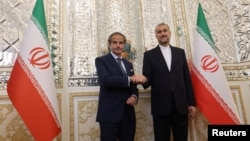The U.N. nuclear watchdog chief Rafael Grossi flew to Iran on Monday to improve his agency’s oversight of the Islamic Republic's rapidly advancing nuclear program.
Grossi warned that Iran has amassed enough highly enriched uranium for “several” nuclear bombs if it chooses to build them.
Iranian officials have threatened they could pursue atomic weapons.
"For us, making the atomic bomb is easier than not building [an] atomic bomb," said Mahmoud Reza Aghamiri, chancellor of Shahid Beheshti University and a specialist in nuclear physics.
Grossi acknowledged the agency cannot guarantee whether Iran's centrifuges are being used for secret enrichment.
"The level of inspection [in Iran] is not at the level we should have," he told Sky News last month.
Iranian media said Grossi will meet Monday afternoon with Iranian Foreign Minister Hossein Amirabdollahian.
Analysts and diplomats say Grossi has limited leverage and must be wary of empty promises.
Grossi is also expected to attend an Iranian nuclear conference Tuesday in the city of Isfahan while on his two-day trip. Isfahan came under Israeli fire in recent weeks despite it being surrounded by sensitive nuclear sites.
Tehran launched an unprecedented drone and missile attack on Israel in April. The strike followed Israel's apparent attack on an Iranian consular building in Syria which killed two Iranian generals and others.
Israel's nuclear weapons program did not dissuade Iran's assault. Experts suggest Iran could pursue the bomb itself after a major attack on it.
"With a tiny open attack on Iranian soil by the U.S. and Israel, I believe Iran will conduct its first atomic test," analyst Saeed Leilaz said in April.
Problems “will only get worse,” Grossi said at an International Atomic Energy Agency Board of Governors' meeting in March. “So, we need to address this in a serious way."
Tensions have heightened between the IAEA and Iran, and since former President Donald Trump unilaterally withdrew America from Tehran's nuclear deal with world powers in 2018. Iran has since abandoned the deal’s limits on its nuclear program.
IAEA surveillance cameras have been disrupted, while Iran has barred some of the agency's most experienced inspectors from its nuclear facilities.





